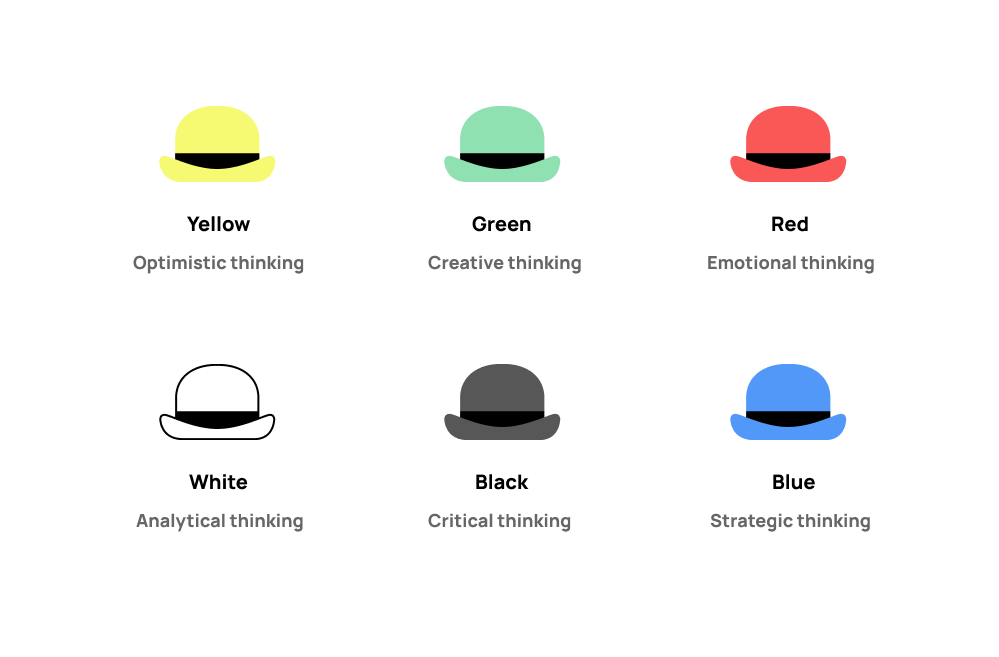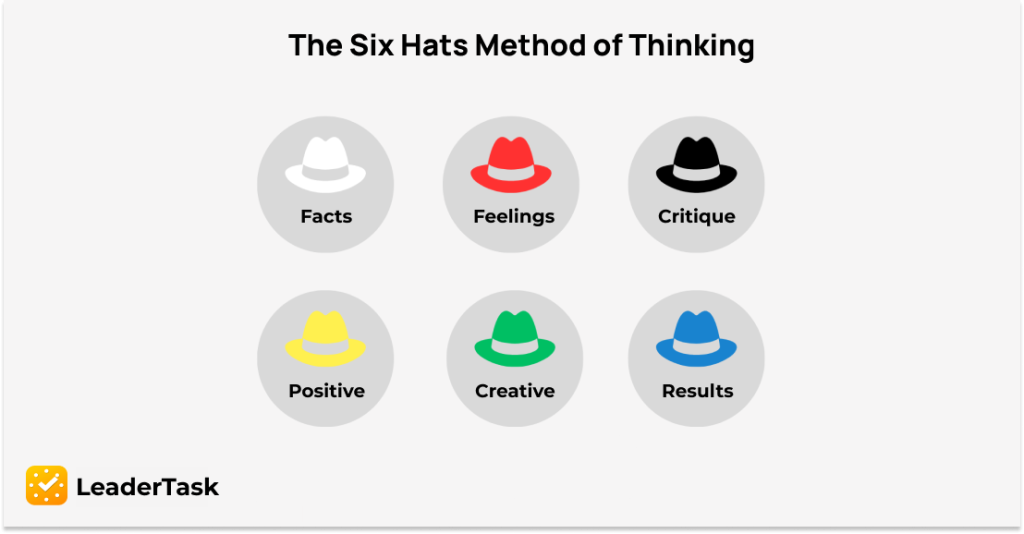The Six Hats Method of Thinking

Every manager faces crises in the course of his work. The further development and success of the business largely depends on how correct and balanced his decision will be at that moment. But how to understand what option will be effective and correct? A huge number of thoughts appear in your head, confused with your own worries and doubts, preventing you from adequately assessing the situation. But if you look at it differently, from a different angle, it can lead to the choice of the right option. Everything seems simple and clear, but how to do it in real conditions? The 6 Hats method developed by Edward de Bono, a well-known psychologist and expert, will help.
What is the essence of the “6 Hats of Thinking” method

It is a special technique of organizing thoughts to help you consider a situation from different angles in order to make a correct and balanced decision. This method is based on the concept of parallel thinking. Many decisions are made through arguments, debates and discussions. In such circumstances, the more persuasive and actively promoted option is often recognized as the correct one. But it is not always the correct one. When using the 6 Hats method, opposing versions, opinions, and approaches do not “clash,” but peacefully neighbor each other.
This technique is a kind of brainstorming or role-playing game, where 6 hats of different colors are six ways of thinking. Literally or mentally trying them on, the person plays the appropriate role, looking at the problem from a certain point of view.
By changing hats, the perspective of the issue changes:
Blue (strategic thinking)

Responsible for setting goals, managing the process, processing the information received. The person who puts it on becomes a moderator, leading the discussion. He sets goals, tasks, asks leading questions, summarizes the results. He does not argue with other hat wearers, does not evaluate their statements. It depends on him how constructive and useful the conversation will be.
The wearer of the blue hat asks himself the following questions:
- Where do I start communicating?
- What is the topic to be discussed?
- What goals need to be achieved?
- In what order should hats of other colors be used?
- How will the results be summarized?
- What will be the outline of the discussion?
The blue hat task is to see the task from the top, make a work plan, analyze the information received and draw conclusions based on it. Strategic thinking is required to manage these processes.
The blue hat can be passed around to other group members so that everyone can participate in shaping the plan and the nature of the conversation. They can make adjustments to the rules, ban certain topics, or contribute other ideas that enhance the conversation.
For example:
“To make our discussion productive, I suggest we set the time limit for each participant to speak at 10 minutes.”
“I believe it is not worth wasting time discussing this issue as it has already been decided.”
Red (emotions, experiences)

According to psychologists, the answers to many questions lie in the subconscious. Trying on this hat, a person gives free rein to his emotions and intuition. He shares with others his fears, experiences, joy, admiration, freely expresses any of his feelings without justifying or limiting their manifestations. This is important when dealing with complex and emotionally filled problems. The main thing is to be extremely honest and sincere towards yourself and other participants in the discussion.
Here are questions that would be appropriate for the wearer of the red hat:
- What am I feeling right now?
- How do I assess the current situation: positively or negatively?
- What does my “gut feeling” tell me about this?
Based on your emotional reactions, you will understand the consequences of your decisions. This will help you take steps to prevent them. Using this hat helps you to see the subject matter from the outside.
When using a “red hat” it is important to keep the following points in mind:
- Time limits of up to 30 seconds are set for reasoning.
- You can talk freely about your feelings without making excuses for other people.
Example:
” I wouldn’t buy this product because of the unfortunate design.”
“I have to be involved in the discussion on this topic because the decision made on it will affect my career with the company.”
If you feel like your decision is the right one, but you are experiencing some anxiety in your soul, this is a reason to think about reconsidering it.
White (analytical thinking)

It is associated with analytics, i.e. with dry figures and facts. Putting on this hat, a person concentrates on finding and analyzing the necessary information, selecting sources where it can be obtained. Here are the questions that are associated with the white hat:
- What data do we have at our disposal?
- What information is missing from the discussion?
- Where can I find her?
The wearer of the white-colored hat captures opposing viewpoints. Analyzes, evaluates the accuracy of the information provided. Separates real facts from hypotheses and assumptions. Summarizes the results achieved: what has been done so far to solve the problem, what attempts are being made to eliminate it, what more can be done to achieve the desired result.
Example:
“Our sales were down 10% this month. At the same time, the average check increased by 15%. I believe this is due to an increase in the price of our company’s goods.
“We conducted an internal investigation to address the issue. It revealed more than 10 violations of technical norms.”
That is, the wearer of the white hat is an outside observer stating specific facts.
Black (critical thinking)

Her task is to conduct research on the issue under discussion in order to clarify the consequences of each decision. The man in the black hat assesses potential risks, looks for hidden threats, identifies weaknesses in the issue under discussion. He backs up his criticisms with concrete arguments. He is given the privilege of interrupting participants wearing other hats. His questions:
- What problems might arise in implementing this idea?
- Where can miscalculations and mistakes be made?
- Where is it better to be careful?
Using this hat helps to generate a negative scenario for each decision in order to develop an effective plan of action in unconventional and difficult situations.
For example:
“I believe it is time for us to stop investing money in this project until it pays off. So far, it brings only losses to the company, and there is no result”.
“I am sure this update will be useless for the client as we have not done any prior analysis of the target audience.”
Yellow (optimism)

A positive outlook on life helps to unlock inner resources and see prospects for growth. The following issues are associated with the yellow color:
- What else can I do?
- How does this help the problem?
- What benefit will I get?
- Why should it work?
The wearer of this hat sees positive aspects in everything and makes positive predictions for the future.
Example:
“We’ve assembled a great team, so we’ll handle the project in minimal time.”
“With such an affordable price and excellent quality, our product is sure to appeal to customers.”
Green (creative thinking)

It implies a creative approach to any case involving non-standard solutions. Creative thinking is important in cases where other methods did not bring the desired result. The man in the green hat fantasizes, proposes any seemingly crazy and strange ideas. Then they are tested for viability and analyzed by the wearers of yellow and black hats.
Issues related to this role:
- What creative ideas do I have?
- Are there any alternatives to this solution?
- What are some ways to avoid the difficulties indicated by the wearer of the black hat?
For example:
“What if we do the exact opposite?”
“Let’s turn on the inner child. What would he want in this situation?”
Each participant of the conversation can express his/her thoughts and ideas without limiting the flight of fancy. It is better to use a green hat after a black one, when there is a clear understanding of the possible consequences of certain decisions.
Method rules
There are a number of rules to follow when applying the 6 hats technique:
- The optimal number of participants for a discussion is 6 people. But, depending on the problem to be solved, the number can be larger or smaller.
- The game has a facilitator who coordinates and establishes the order of the speeches. He or she reminds each hat wearer of his or her role, introduces them to each other, and explains how they will interact with each other.
- The hats can be real or virtual. The discussion ends when all participants have worn them.
- It is desirable to record the ideas, thoughts and recommendations expressed. A blackboard or a tape recorder can be used for this purpose.
- After summarizing the results of the conversation, the facilitator provides the results to all team members.
The order of putting on the hats may look as follows:
- A white hat opens the conversation. Facts, specific data related to the topic under discussion are discussed.
- The wearer of the black hat enters the conversation. He provides the same information in a negative light to find problem areas.
- Behind him, the yellow hat speaks out, with a positive view of the problems outlined.
- The green hat is used only after the situation has been thoroughly investigated and considered from all sides.
- The red hat is used for defusing, on rare occasions.
Next, the yellow and black hats are repeated. Their task is to double-check the new ideas. The bearer of the blue hat concludes the discussion. He summarizes the results of the event.
How to use the LeaderTask service for the 6 hats technique

To collect, record, check, analyze information when working with the 6 Hats method, you can use a modern digital service – a functional application for planning and organizing work in a team LeaderTask. With its help, you will make lists of questions to be discussed in a brainstorming format. Assign roles to the participants of the event. Record all important information on a kanban board, you will be able to control and monitor the process of accomplishing tasks.
Thanks to a convenient chat room, you can discuss any issues remotely. Organize structured and systematized storage of information with quick access to data at any time, anywhere, even if there is no Internet connection.
The application integrates with all digital platforms, has a high-quality mobile version, so it will always be at hand when you need it. It has extensive functionality and a full set of tools for organizing work in a team, suitable for effective planning, solving any current and strategic tasks.
Conclusion
The 6 hats of thinking is a convenient method for assessing any problem. It combines a rational analytical approach and an emotional representation of the situation. Seeing it from other angles, you can make a workable plan of action, prevent many miscalculations and mistakes. This technology is suitable for various spheres of life. It can be used to make the right decisions in difficult situations, used in lessons, in business, in personal life. With its help you can better understand yourself, your problems and inner feelings.
You can use a different number of hats, depending on the situation. The main thing is that the dialogue should be organized and orderly. Under all conditions, the blue hat plays the main role in the discussion.



